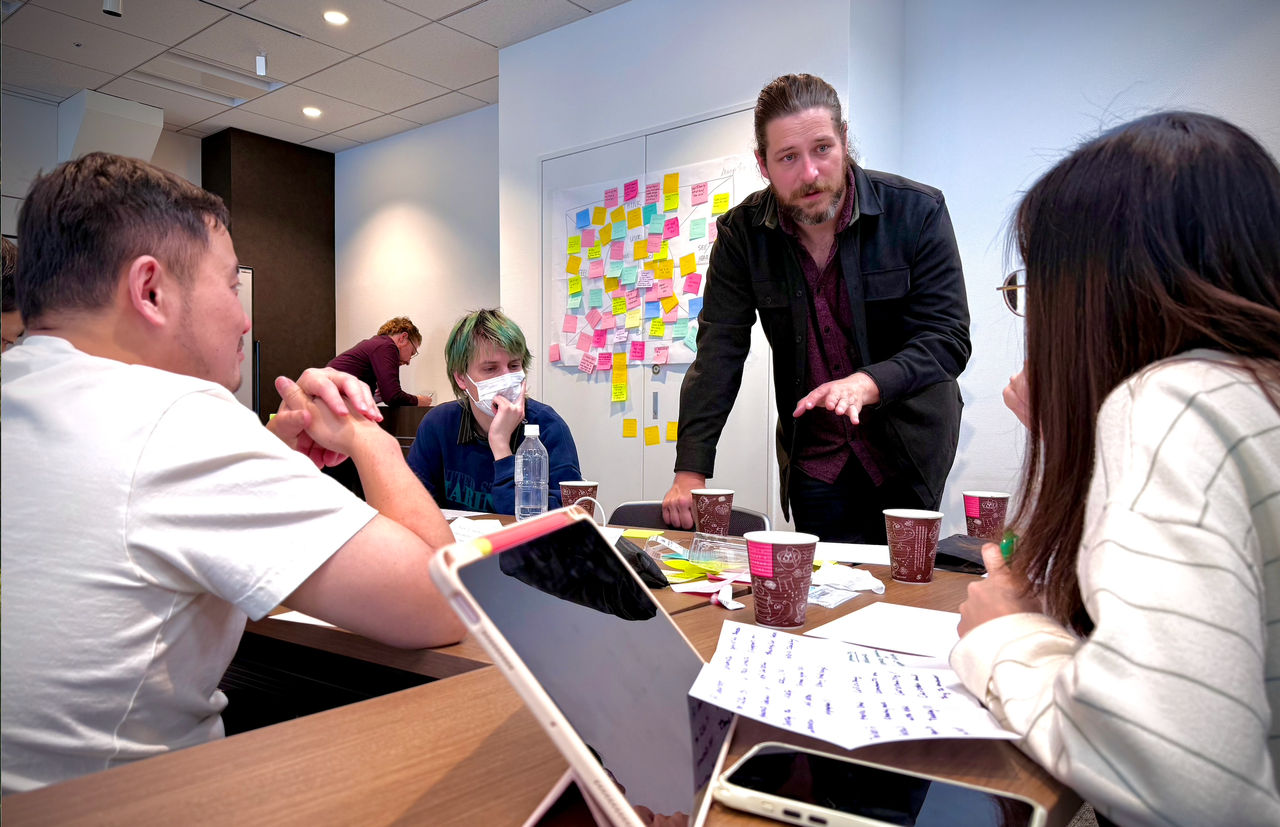
Cheryl Boyd
Global Vice President, Digital Strategies

Dear Cheryl,
I am eager to get together with you and share an opportunity to work together!
I have an idea for a project that will help young people share their story. As their peers hear their story, they will know that they are not alone. They will be encouraged to persevere and they will be motivated to share their story, too.
Can we get together and talk more about how we could work together?
Yours truly,
Pat
I received this email from a Christian faculty member of a local university.
I had some time in my schedule, and SLM is a priority for our organization, so I met with Pat to learn more about the project. While I decided not to collaborate, I did introduce Pat to others I knew who had more in common with the goals of the initiative.
I imagine that you get emails inviting you to collaborate, too. Some of you are quick to say, “Yes!” Some of you are inclined to respond with a “No, thank you.” Which answer do you typically give?
Interdependence is one of the leadership mindsets that will lead us to greater fruitfulness in the Great Commission. We cannot accomplish it alone. Interdependence requires collaboration. If you are not working together, you are working in a silo. If you are working in a silo, you are neither collaborating nor achieving interdependence. You are also missing out on fruit that God has for you. We need wisdom to know which collaboration opportunities should be prioritized.
Collaboration can be costly. Aligning your goals and approaches takes more time. It will almost certainly require crucial conversations and conflict resolution. However, the fruit of this kind of work can grow your character and increase trust with those you are collaborating with.
Collaboration can require people and money to accomplish the work together with others. It can also lighten the load. The right kind of collaboration can yield greater results as you share resources for outcomes that advance aspects of the mission that both parties care about.
Above all else, discernment about collaboration requires wisdom from the Holy Spirit. Take a moment to breathe deeply and ask the Holy Spirit to guide you in your response to any collaboration invitation. If you aren’t certain how you should respond, take a curious posture and ask more questions. Learn more about the goals, priorities, and values of the other party. Even if your answer is, “No,” you can bless them and pray for the work God has called them to do. If you aren’t sure, assess your current situation. If you have time and resources to give, start small and offer to take on a small experiment in collaboration. That will give you a chance to see if the partnership is a good fit for both of you. If you are stretched beyond your capacity, offer your blessing and don’t feel guilty about declining their invitation. If you really think it is a good opportunity, you can suggest working together sometime in the future when you have more margin to give.
You will not get it right every time, and not every collaboration goes well. That has definitely been my experience. I encourage you to stay open to the Spirit’s leading. Do not rush your response. Remain prayerful, open, and avoid reacting out of a scarcity mentality or out of fear.
When the next invitation to collaboration comes, challenge yourself. Slow down and reconsider your first inclination. Why do you give the answer you do? What principles guide you? Are you missing out on fruit, or are you squandering resources that could be stewarded more effectively elsewhere?
The following articles are from leaders who have a lot of experience with collaboration. I am confident you will be encouraged to learn from them as you improve your ability to collaborate more effectively!
Together with you,
Cheryl
Roland Osvath
Digital Strategist, Global Digital Strategies

Last month, about sixty DS staff from all over Europe met in Germany as part of our all-staff conference. During this time, we identified dozens of opportunities and challenges, voting on the most important ones. The opportunity that got the most votes? Collaboration with others! The challenge with the most votes? It also had to do with collaboration.
Collaboration is both a huge opportunity and a huge challenge. I experienced it in the 1990s, when the Hungarian ministry had an awesome opportunity to share the gospel in basically all the high schools in the country. Obviously, we could not do it alone. We were looking for partners all the time. Though we had quite a few partnering churches and organizations, we were not totally satisfied. The opportunity was huge, but it seemed like some just did not understand it. No matter how we tried to demonstrate the opportunity, they simply did not want to partner with us.
Then, in one conversation, someone realized our problem: “Our potential allies feel that we are not looking for partners, but are looking for volunteers. And they don’t want that.” He was right. We already knew what we wanted, we already knew how we wanted to do it, and we had already decided almost everything. We just wanted others to help us reach our goals with our methods. And they said, “Thanks, but no thanks.”
I thought I had learned the lesson. Then, twenty years later, I had a partnership opportunity. I was working on the Hungarian version of an online discipleship platform when a successful Christian businessman wanted to meet me. He had heard about the same platform elsewhere in Europe and wanted to partner with us to create it in Hungary. He asked me if we wanted to collaborate. I was thrilled. But then I had to realize something: this time, he was the one not looking for a partner, but a volunteer. I understood that instead of an ally, I got myself a boss! He was kind and polite, but he wanted me to help him reach his goals. He wanted me to work for him. Our “collaboration” ended in less than a year.
I now believe that all partnerships are better off with clear roles: it helps to agree on a clear leading partner from the beginning. But partnerships are about common goals and common decisions. If I am only looking for volunteers, or someone wants me to be theirs, we'd better not call it a partnership. It will not work, and people will end up getting hurt. But if we can avoid this trap, we can take a huge step toward something really beautiful.
Question: If you think of your own partnerships or collaboration opportunities, how can you avoid the trap of mistaking volunteers for partners—or ending up with a boss instead of a true collaborator?
Vladimir
NAMESTAN Digital Strategies Leader
Collaboration is a strong and important tool in ministry. When it works well, it gives more creativity, helps us reach more people, and brings results that one team alone cannot achieve. But sometimes people call it “collaboration” when they just work next to each other without a real connection. In this case, both sides can feel tired, disappointed, and ask, “Why did we spend this time?” Sometimes people even feel pressure from outside to “collaborate,” but there is no real heart in it. The real collaboration comes from a need; it comes from the heart.
In June, we had the Namestan DSLM Content Strategy Summit. This event is a good example of how collaboration can work well. It was run by the NAMESTAN SLM Ministry. Campus Staff, students, and leaders from different countries who are interested in digital were invited, along with members of the GDS team. Our goal was simple but big: to teach champions in campus teams how to use digital methods and content strategy to win, build, and send in their own ministry and context.
From the start, we had the same vision. SLM teams and Global Digital Strategies facilitators understood that we were not only giving information, but also helping to build real skills for the future. In the sessions, we spoke about audience mapping, creating personas, using different tools, and making content with AI. Participants learned practical things they can use in their ministry. One staff member said, “Finding a persona is very important—the audience map opened my eyes.”
We also learned together. Feedback from participants showed that most sessions were very helpful, but some could have been deeper or for different levels of experience. This feedback is valuable for next time. Good collaboration means not being afraid to see what can be better, because there is trust that it will help us grow.
What helped this collaboration work? First, SLM saw a need. Then, it became a shared purpose—everyone knew why we were doing it. Second, everyone gave something. People were not only listening but also speaking and giving ideas. Third, we had a clear plan with goals, sessions, and follow-up. And last, we were open to feedback, which turned into lessons for the future.
Bad collaboration happens when goals are unclear, expectations are different, or one side does all the work. The NAMESTAN summit was more than just training. It showed how real collaboration can help grow a ministry in a region. We left encouraged, with new skills and stronger friendships.


©1994-2022 Cru. All Rights Reserved.